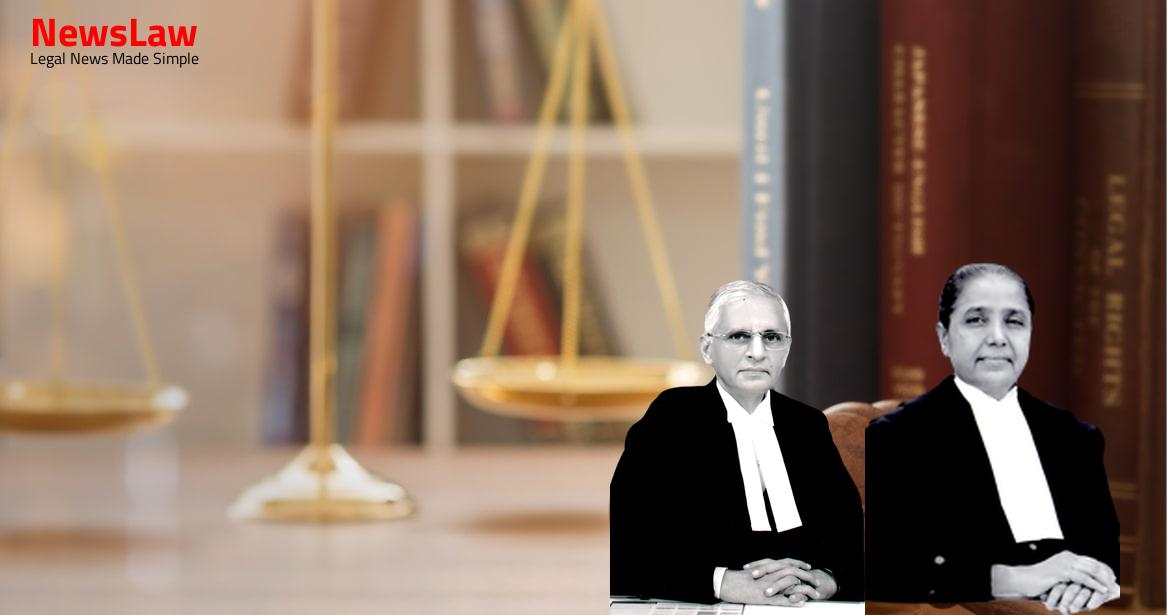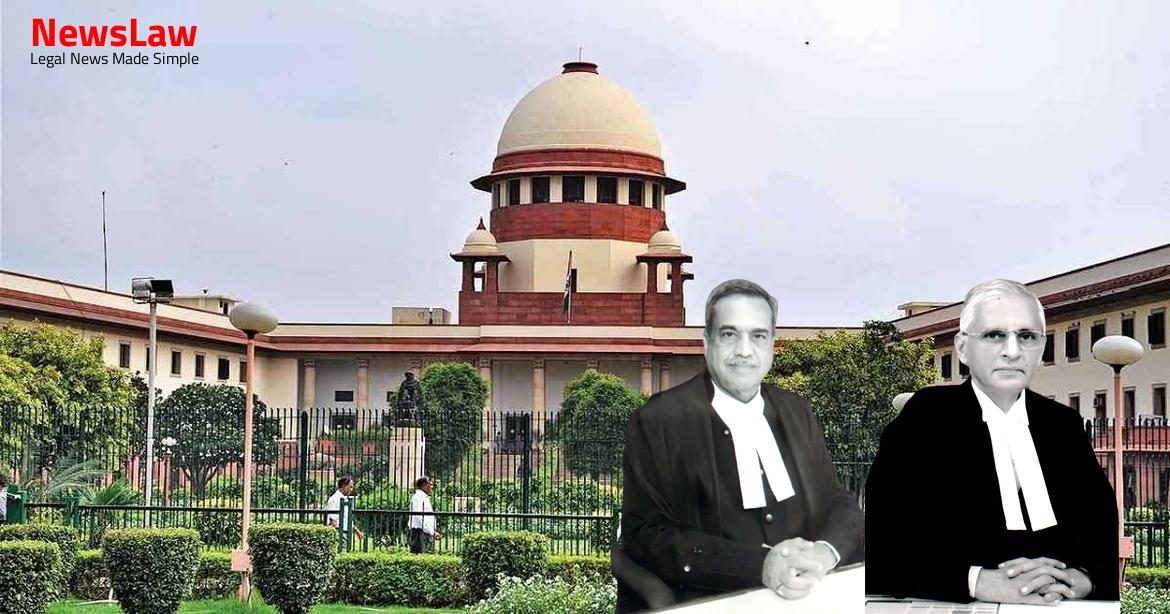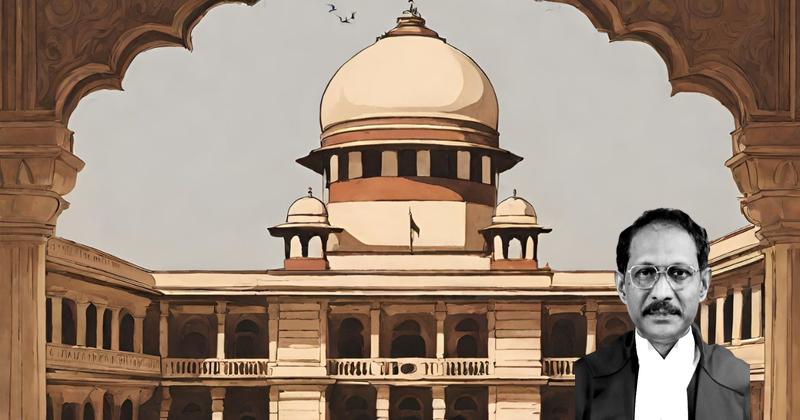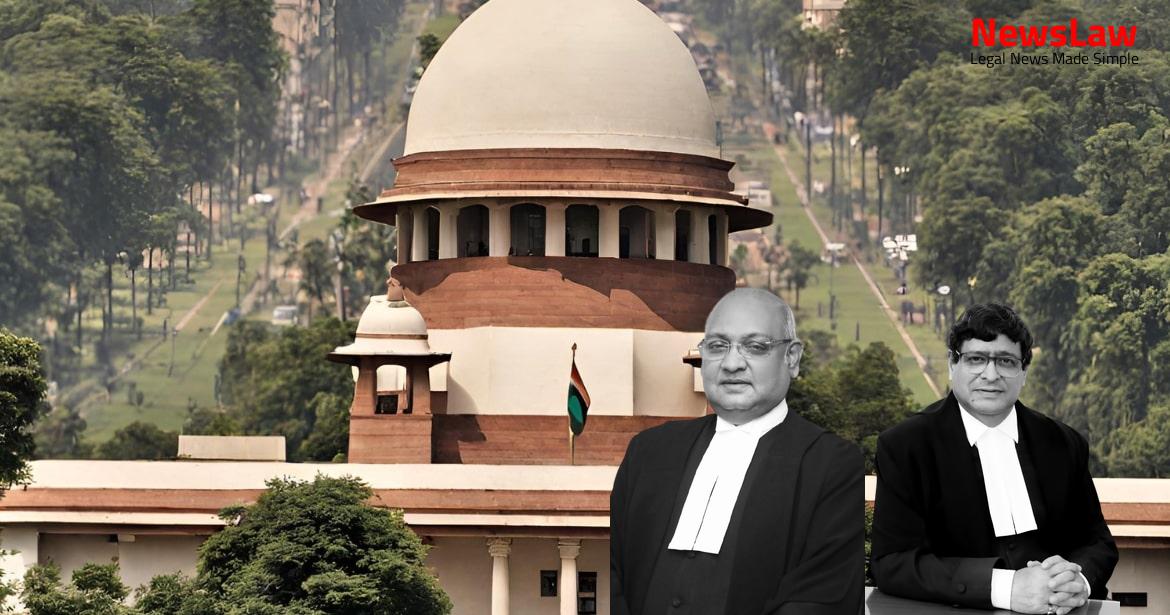In a significant legal case involving allegations of forgery and cheating, Mahendrakumar brought forward a case against Yogeshbhai Patel. The High Court declined to quash the FIR, finding a prima facie case based on expert opinions regarding discrepancies in signatures. Stay updated on the developments in this case as it unfolds.
Facts
- The High Court referred to the hand-writing expert’s opinion regarding the signatures in the receipts not matching with Mahendrakumar’s signature.
- Prima facie case of forgery and cheating against the appellants was found based on the allegations and facts.
- The High Court declined to quash the FIR No.I-194/2016 and dismissed Criminal Misc. Application No.2735/2017.
- The appeals arise from the High Court’s judgment dated 14.12.2018 dismissing Criminal Misc. Application No.2735/2017.
- A bailable warrant for the production of accused Yogeshbhai was issued by the Court of 5 Additional Civil Judge & JMFC, Bharuch on 06.09.2016.
- The Criminal Misc. Application No.24588/2017 filed by Yogeshbhai was allowed based on the order passed in Criminal Misc. Application No.2735/2017, resulting in the quashing of the criminal case in C.C.No.367/2016 filed by appellant No.3-Hasmukhbhai under Section 138 of N.I. Act.
- Summary Suit No.105/2015 for recovery of Rs.1,20,00,000/- was filed by the third appellant-Hasmukhbhai based on four receipts allegedly issued by Mahendrakumar.
- Yogeshbhai is accused in a case under Section 138 of N.I. Act filed by appellant No.3.
- Appellant No.3 alleged that Yogeshbhai issued four cheques of Rs.30,00,000 each, all dishonoured due to ‘Payment stopped by the Drawer’.
- Appellant No.1 filed a suit claiming his share in land sold by Yogeshbhai, leading to a compromise where Yogeshbhai was to pay Rs.90,00,000.
- Forgery and cheating allegations were made against appellants for creating fabricated receipts.
- FIR registered against appellants under various sections of IPC.
- High Court directed police to investigate after handwriting expert’s report indicated forged signatures on receipts.
- Yogeshbhai executed a registered Sale Deed in favor of a company for Rs.6,16,44,000.
- Multiple legal notices, complaints, and applications filed by parties in the ongoing legal proceedings.
Also Read: Judgment on Service of Summons and Authenticity of Power of Attorney
Arguments
- Appellants argue that the FIR filed by Mahendrakumar is false and frivolous as the matter is already pending in Summary Suit No.105/2015.
- They state that two cases, including the criminal case under Section 138 of the N.I. Act, are already ongoing between the parties, making the registration of the criminal case improper.
- The issue of the genuineness of the receipts is a key point in the civil suit, and the FIR continuing would prejudice the parties’ interests.
- They highlight that the handwriting expert’s opinion, though relevant, is not conclusive evidence according to Section 45 of the Indian Evidence Act.
- The High Court is criticized for not considering the admission of issuance of cheques by Yogeshbhai from his NRE Account.
- The appellants claim that continuation of the criminal case is an abuse of court process due to the pending civil suit on the same subject matter.
Also Read: Balaji v. Nargolkar: Auction Sale Set Aside
Analysis
- Yogeshbhai raised the defense of no enforceable debt and claimed issuing the cheques to help appellant No.3-Hasmukhbhai for land purchase.
- Section 73 of the Indian Evidence Act allows the court to compare admitted and disputed writings.
- FIR should not have been registered solely based on the handwriting expert’s opinion.
- Continuation of the FIR was deemed an abuse of the court process, leading to its quashing under Section 482 Crl.P.C.
- Handwriting expert found the signatures on receipts did not match the sample signatures of Mahendrakumar.
- Even if the issuance of cheques is admitted, the presumption under Section 139 of the N.I. Act favors the holder of the cheque, appellant No.3.
- The High Court was criticized for quashing the criminal case filed by appellant No.3-Hasmukhbhai under Section 138 of N.I. Act.
- Yogeshbhai had admitted to issuing the cheques.
- Presumptions under Section 139 of the N.I. Act and Section 118(a) of the Indian Evidence Act are rebuttable.
- The High Court should not have quashed the complaint under Section 138 of the N.I. Act without adjudicating disputed questions of facts.
- Section 138 complaints can be quashed on legal issues like limitation, but not solely based on inter se disputes between parties.
- The High Court erred in not considering the statutory presumption under Section 139 of the N.I. Act.
- The presumption under Section 139 of the N.I. Act continues until the accused rebuts it with evidence.
- The burden of proof lies on the accused to rebut the presumption by adducing evidence.
Also Read: Jurisdiction of Family Court in Cases under Muslim Women’s Protection Act
Decision
- FIR No.I-194/2016 quashed based on Criminal Misc. Application No.2735/2017 filed by the appellants.
- Criminal Misc. Application No.24588/2017 filed by Yogeshbhai Muljibhai Patel dismissed.
- C.C.No.367/2016 filed by appellant No.3- Hasmukhbhai Ravjibhai Patel under Section 138 of N.I. Act stands restored.
- Summary Suit No.105/2015 to be proceeded in accordance with the law without considering High Court views expressed in the impugned order.
- The 5 Additional Civil Judge & JMFC, Bharuch directed to proceed with the case in C.C.No.367/2016 under Section 138 of N.I. Act, providing sufficient opportunity to both parties and dispose of the same as per the law.
Case Title: RAJESHBHAI MULJIBHAI PATEL Vs. THE STATE OF GUJARAT (2020 INSC 160)
Case Number: Crl.A. No.-000251-000252 / 2020



